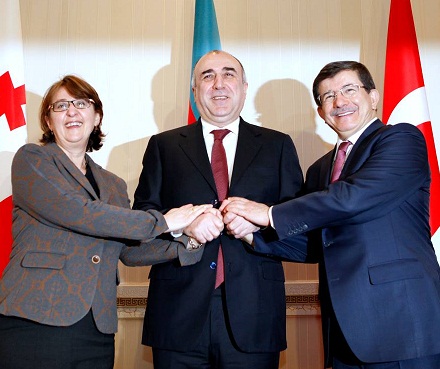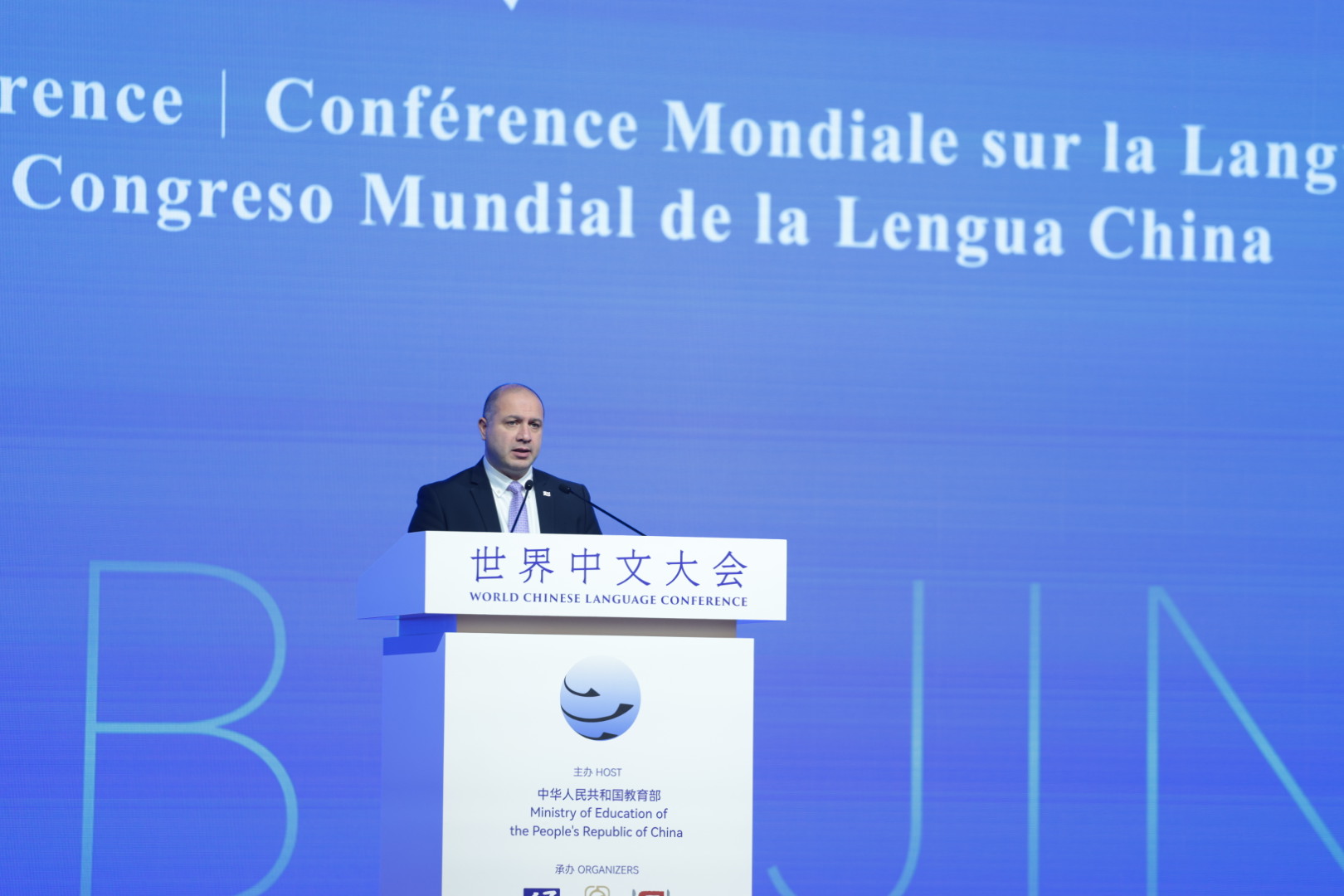
From Alliance to Integration: The Turkey-Azerbaijan-Georgia Triangle
From Alliance to Integration: The Turkey-Azerbaijan-Georgia Triangle
On February 19, 2014, the Third Session of the Trilateral Meeting of Ministers of Foreign Affairs of Azerbaijan, Georgia and Turkey was held in Ganja (northwest Azerbaijan). After their ministerial—the first trilateral meeting following last year’s presidential elections in Azerbaijan and Georgia—the three sides adopted the Ganja Declaration (https://www.dha.com.tr/azerbaijani-georgian-and-turkish-foreign-ministers-adopt-joint-declaration_604989.html). Experts expected that under the new presidency of Giorgi Margvelashvili, Georgia would fist seek to establish better relations with Russia. But in fact, following his inauguration, President Margvelashvili paid his first international visit to Turkey and his second to Azerbaijan. Building on these ever closer trilateral ties, the February 2014 Ganja Declaration stated that the three countries were ready to start preparations on holding a presidential summit.
The Baku-Tbilisi-Ankara triangle emerged in the 1990s and was reanimated after the August 2008 Russian invasion of Georgia. In light of the geopolitical fallout from the Russian-Georgia war, the United States’ eventual reset policy with Russia, and the inefficacy of the European Union in the region, as well as Turkey’s parallel proactive regional diplomatic efforts, the strategic Baku-Tbilisi-Ankara triangle was reactivated by its three participants. The first trilateral meeting between them was held in Trabzon, Turkey, in 2012; the second was in Batumi, Georgia, in 2013; and the third was in Ganja. All three ministerials concluded with declarations, which comprised of four main issues of interest to the trilateral partners: security, energy, transportation, and trade and economy.
Security: In terms of addressing security issues, all the trilateral declarations to date have focused on three main aspects: the sovereignty and independence of states; separatism and threats against their territorial integrity; and cooperation against non-traditional security threats. The emphasis on sovereignty and independence is of particular importance to Georgia and Azerbaijan, both of which have territories occupied by foreign states. In particular, the Ganja Declaration supports the peaceful settlement of Azerbaijan’s Karabakh, as well as Georgia’s territories of Abkhazia and South Ossetia, on the basis of respect for the sovereignty, territorial integrity and inviolability of the internationally recognized borders of these two states (https://www.dha.com.tr/azerbaijani-georgian-and-turkish-foreign-ministers-adopt-joint-declaration_604989.html). During the last visit of Georgian President Margvelashvili to Azerbaijan, his host, President Ilham Aliyev, again noted that Azerbaijan’s and Georgia’s territorial integrity and international law had been harshly violated by their neighbors (Azertag, February 12). Moreover, Turkish Foreign Minister Ahmet Davutoglu wrote in his book, Strategic Depth, that the occupation of Azerbaijani Karabakh by Armenia represented Turkey’s greatest strategic loss following the end of the Cold War (Ahmet Davutoglu, Strategic Depth: Turkey’s International Position, Istanbul, 2001).
Such rhetoric notwithstanding, the Baku-Tbilisi-Ankara triangle is not military alliance in the traditional meaning. Indeed, the three parties have never signed a common military agreement. And notably, the trilateral security agreement signed in April 2002 detailed non-traditional security threats such as smuggling, terrorism, organized crime and other issues mostly unrelated to interstate war (Ministry of National Security of Azerbaijan, September 25, 2002).
Energy links: The Baku-Tbilisi-Ceyhan (BTC) crude oil pipeline, the South Caucasus (Baku-Tbilisi-Erzurum) natural gas pipeline, the Trans-Anatolia gas pipeline (TANAP) and the Trans-Adriatic gas pipeline (TAP) physically link these states across their territories. Moreover, each of these three countries is part of the European Union’s INOGATE program, which aims to bring Caspian and Central Asia energy resources to the West, particularly by integrating the post-Soviet transit states into global markets and by bringing global investment to the region.
As the late Eurasia scholar Alexandros Peterson has written, Azerbaijan possesses significant reserves of highly valued natural resources; Georgia serves as a geographically crucial transport corridor; and Turkey has deep and sustained access to world markets and international partners (https://etheses.lse.ac.uk/532/). To develop their energy importance for the West and global energy markets, the triangle has tried to extend its combined energy links to the countries of Central Asia. Accordingly, the Trabzon Declaration adopted by the three partners in June 2012, explicitly supports the territories of Azerbaijan, Georgia and Turkey becoming a transit corridor for Central Asia energy exports to international markets (https://www.civil.ge/eng/article.php?id=24868).
Transportation: The position of Azerbaijan, Turkey and Georgia is pivotal along the East-West as well as North-South energy, transport and communications corridors. Notably, each state is a member of the East-West Transport Corridor Europe-Caucasus-Asia (TRACECA). Next year, the three countries are planning to finish the Baku-Tbilisi-Kars (BTK) Railway, which will initially transport 1 million people and 10 million tons of cargo per year (see EDM, October 17, 2013). After the completion of the Aktau-Urumqi railway (linking Kazakhstan’s Caspian Sea coast with China) and its connection to the BTK, the rail corridor across Azerbaijan, Georgia and Turkey will unite the railway networks of Central Asia, the Caucasus and China with those of Turkey and Europe, facilitating the movement of cargo between Asia and Europe. As such, the BTK will become a key section of the “Iron Silk Road” of the 21st century (see EDM, January 14).
Trade and investment: Despite the Baku-Tbilisi-Ankara triangle’s successes across various dimensions, some shortcomings remain in the trilateral relationship. Trade turnover among these states totals only about $4.2 billion, which is less than 3 percent of Turkey’s entire foreign trade, 8 percent of Azerbaijan’s foreign trade, and 20 percent of Georgia’s international trade (https://www.mfa.gov.ge/index.php?lang_id=ENG&sec_id=73).
But in terms of investment, the situation is more positive. The volume of Azerbaijan’s investment in Turkey stands at $5 billion, and the Azerbaijan State Oil Company (SOCAR) plans to invest a total of $17 billion in the Turkish economy by 2018. According to Azerbaijan’s Minister of Economic Development Shahin Mustafayev, Turkish economic projects in Azerbaijan equal $4.7 billion, and Turkish investment in Azerbaijan’s non-oil sector exceeded $1.5 billion. Azerbaijan’s investment in Georgia amounts to $210 million. Turkish companies have invested $1.1 billion in projects in Georgia, while Georgian investments in Turkey amounted to $23 million (https://www.azernews.az/business/54501.html).
For the most part, Georgia, Turkey and Azerbaijan have built their trilateral relationship more strongly on the basis of economic and infrastructure projects rather than on an explicit security partnership. The three governments hope that this approach might impact positively on the larger region, transforming relations there from being dominated by inter-state security concerns to multilateral prosperity and economic cooperation. Armenia is currently not a party to these cooperation efforts, but the three partners have openly invited Yerevan to participate, such as in the text of the Baku-Tbilisi-Kars Railway Declaration, signed by Baku, Tbilisi and Ankara in 2007.
As Grigol Vashadze (Georgian foreign minister, 2008–2012) noted in June 2012, the Baku-Tbilisi-Ankara triangle is not directed against anyone, and it seeks to establish good relations with other regional states (https://www.civil.ge/eng/article.php?id=24869). Nonetheless, the triangle’s orientation is clear: it has adopted integration with Western organizations rather than other regional projects such as the Commonwealth of Independent States (CIS) or the Eurasian Union. Indeed, the Trabzon Declaration stresses the importance of continued cooperation within the Partnership for Peace program and other areas of cooperation with the North Atlantic Treaty Organization (https://www.civil.ge/eng/article.php?id=24868). It remains to be seen how the ultimate resolution of the Ukrainian conflict, just across the Black Sea from Turkey and Georgia, affects the strength of this trilateral partnership in the near future.


